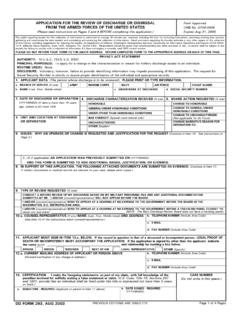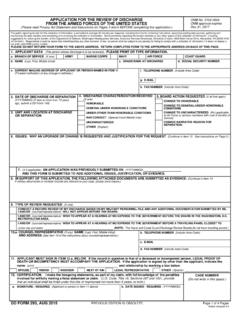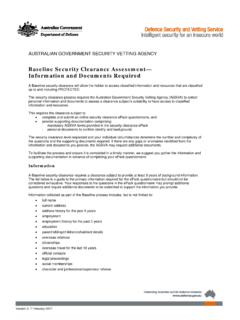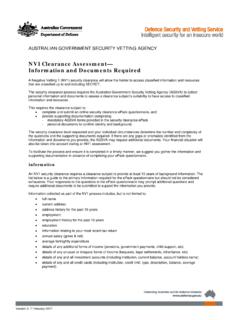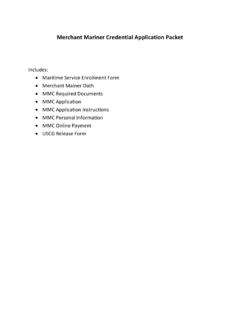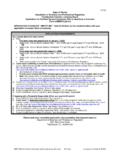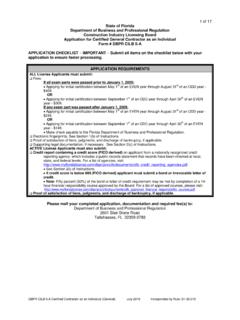Transcription of PTSD, VA Benefits & Discharge Upgrade - chicagovfp.org
1 ptsd , VA Benefits & Discharge Upgrade It is all too common for veterans who are suffering from ptsd , Post Traumatic Stress Disorder, to also have a less than honorable military Discharge , which keeps them from getting help from the VA for their ptsd . In addition, many vets suffering from ptsd are discharged with a diagnosis of personality disorder, which may delay VA Benefits . There are two ways to overcome these obstacles; change the Discharge or get the VA to grant Benefits regardless of what the Discharge says. You can pursue both options at the same time and use a positive result from one in support of the other. You can go to the BCMR, Board for the Correction of military Records or the DRB, Discharge Review Board, and ask them to change ( Upgrade ) the military Discharge . You can also ask the VA to grant Benefits in spite of the bad Discharge or the inaccurate diagnosis. The key to both routes is using a medical opinion as evidence. The BCMR should Upgrade the Discharge if they are convinced that either the punishment was too harsh for the crimes that you did or if the military violated Discharge procedures.
2 GI s who were suffering from ptsd can argue both points. You can argue that ptsd affected your ability to control your behavior, and therefore, your misconduct should be forgiven or punished less severely. If there is evidence of treatment for ptsd or depression or stress while you were still in service, you can also argue that you should have been given a medical Discharge . They will change the reason for Discharge with a medical opinion explaining the mistake.. The VARO, VA Regional Office, will initially deny claims from vets with less than honorable discharges, Bad Conduct Discharges, BCD's, given in a court martial or General Discharges under Other Than Honorable conditions, OTH's, because they can't give Benefits to those who served dishonorably. You can appeal and ask for a character of service hearing where you can tell your story. At this hearing you can use your military records to show that you did not serve dishonorably until the service connected ptsd affected your ability to serve and that the misconduct that resulted in your bad Discharge was minor, out of character and due to untreated ptsd .
3 You can repeat the arguments that you made to the BCMR and add that if your service connected ptsd had gotten proper treatment that you would have been given a disability retirement and no misconduct would have occurred. These arguments are rarely successful without a properly worded medical opinion as supporting evidence. The first thing needed is a confirmed diagnosis of ptsd . The doctor doesn't have to repeat the specific incidents that caused the ptsd , just what kind of incidents, such as combat, seeing buddies die, treating the wounded etc. Also the opinion need not give specific behavior that is seen as ptsd symptoms, just what kind of behavior, such as flashbacks, trouble with anger control or sleeping, etc. The VA will need specifics in order to assign a degree of disability rating, . especially if the ptsd causes unemployability. When appropriate, the medical opinion needs to explain the cause and effect of combat leading to stress severe enough to lead to misconduct resulting in the bad Discharge .
4 It's important to tell a doctor who might be willing to help on this issue that their conclusions don't have to be absolutely, 100% certain. The VA's benefit of doubt doctrine means that the evidence for and against a certain conclusion is weighed and the vet wins if there is at least an approximate balance of this the evidence. The doctors need to express their degree of certainty in the opinion. The VA is looking for a phrase such as at least as likely as not.. The doctor may not feel confident that they're giving an accurate opinion without seeing some kind of verification of the veteran's history from someone other than the veteran. This is where you can use military records to verify service and prior medical treatment records and statements from friends or family to verify the vet's behavior. These buddy statements should start with I hereby swear the following to be true and the signature should be notarized. This makes it an affidavit.. These should also be submitted to the VA.
5 At this point the VARO will see this as a claim that the ptsd is service connected and will want to look in official military records in order to confirm that the ptsd stressors (the incidents that caused the ptsd ) really happened. However, the doctor doesn't need to wait for this verification and can simply say that the history given by the veteran would cause ptsd . The VA will need to make two separate determinations, that the character of service was not dishonorable and that the ptsd is service connected.. This is just a brief overview. Case specific details will be needed for further advice. Ray Parrish, 773-561-8829.

